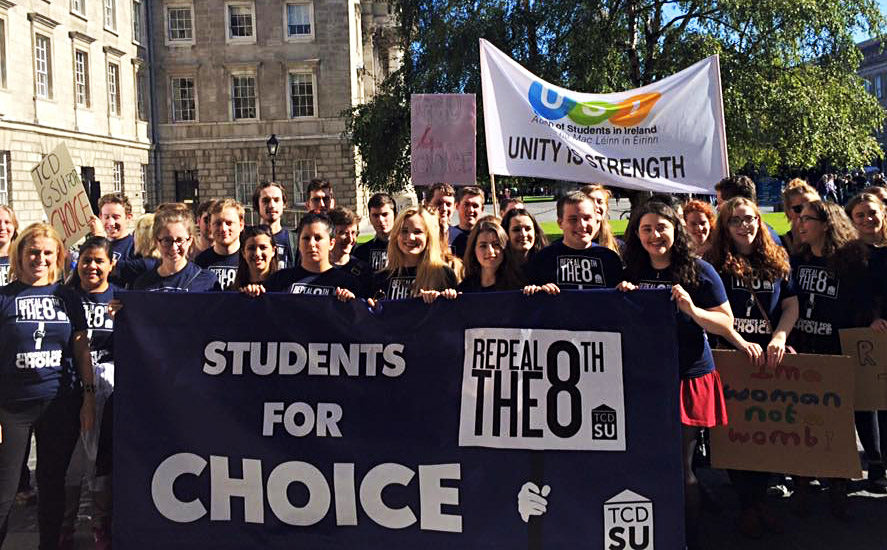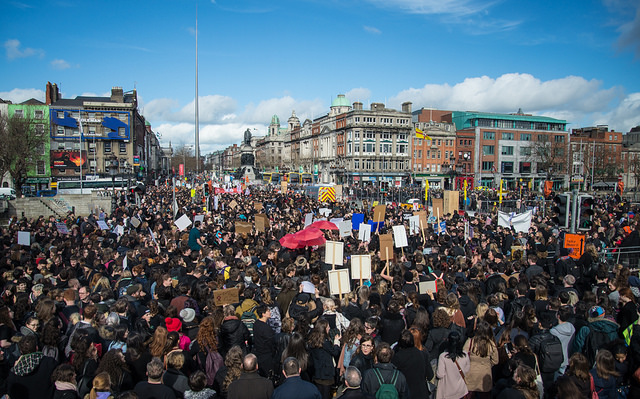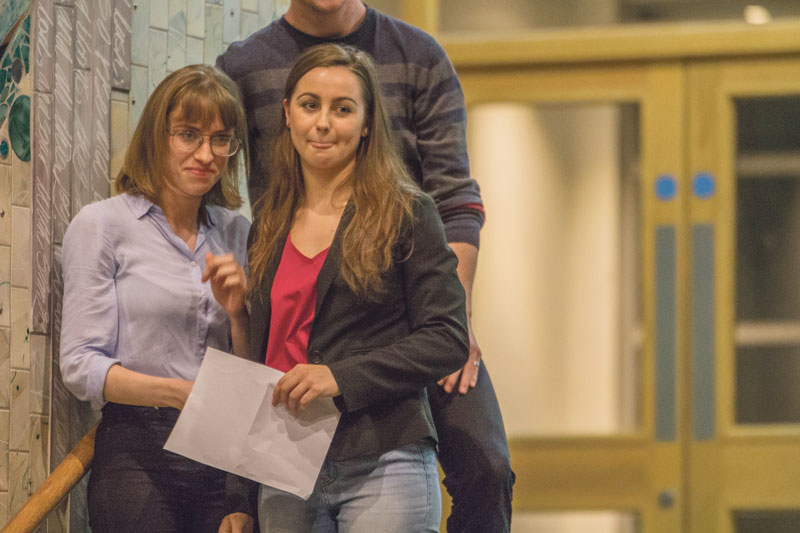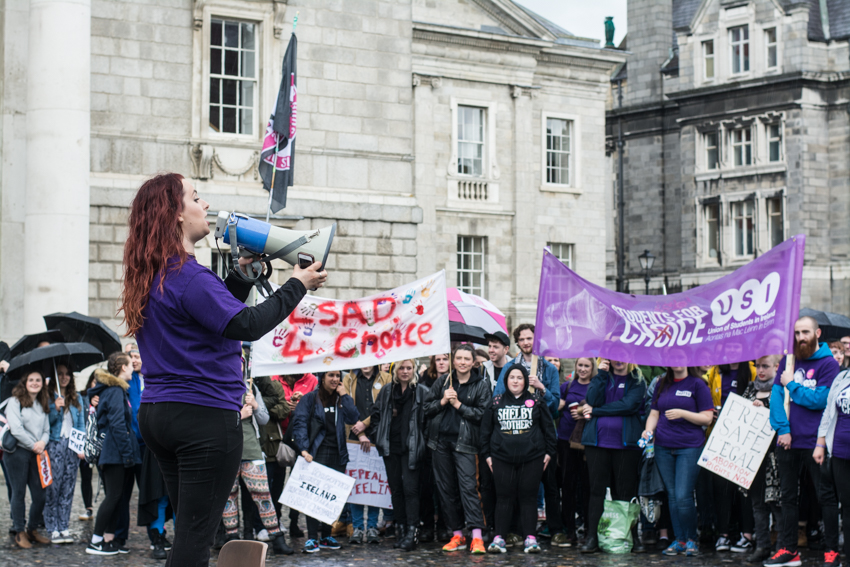At 7am this morning, the polling booths opened and the repeal referendum juddered to its conclusion. Tomorrow, we will learn the results of perhaps the defining social issue for this generation. It’s been a long time coming.
For many people, students and non-students alike, today’s referendum marks the culmination of decades of activism and campaigning. It’s not news that students have uniformly been at the vanguard of social change in Ireland, but the fury with which so many have fought, kicked, bitten, struck, all for repeal, means their contribution is well worth examining in the lead-up to tomorrow’s vote.
In 1989, Ivana Bacik, then-President of Trinity College Dublin Students’ Union (TCDSU), was chased through House Six by the Gardaí. Her crime? Publishing information on abortion in the union’s freshers’ handbook. Bacik, who has been a vocal and consistent campaigner for a repeal of the eighth amendment, is as well placed as anyone to analyse student involvement in the abortion rights campaigns. She told The University Times that “the student campaign has been hugely important in mobilising generations of young people”. Bacik said she felt part of a lineage of abortion rights campaigners: “It’s been 35 years now, so…”
Writing in The University Times in 2016, Bacik recalled being told by Mary Robinson – who represented Bacik and her fellow TCDSU officers throughout the case – to pack a toothbrush, in readiness for prison. Such was the seriousness of their situation.

In the 29 years since Bacik was brought to court, Ireland has come a long way. In 1995, divorce was legalised, albeit by a tiny majority. Three years ago, gay marriage was legalised, with Ireland becoming the first country to do so by popular vote. Such was the clamour that Taoiseach Leo Varadkar could not realistically have resisted for much longer the cacophony of voices demanding the opportunity to vote on the eighth amendment. Loudest, as usual, among these voices were those of students.
In recent years, the story has been of ever-bigger crowds and ever-louder shouts. Last March, Strike 4 Repeal – a youth-led movement – brought thousands of students out of lecture theatres and onto the streets, demanding a referendum. As displays of strength go, it was of enormous significance. The lightning bolts, the black-clad masses, brought to a national platform the idea that repeal was an issue around which students could gather in huge numbers, and with huge commitment.
Then, in September, students joined 30,000 on the streets of Dublin calling for repeal. With a date for the referendum not yet decided, the Union of Students in Ireland (USI) gathered together over 1,000 students to Front Square before the march.
For TCDSU, which has had a pro-choice mandate since 2014, the emphasis on campaigning for repeal campaign has been consistent and has offered Trinity students a platform to fight from the front. This has held true from September 2015 – when the union sent its first delegation to the annual March for Choice – right up until the present day, with current TCDSU President Kevin Keane placing a huge emphasis on the issue during his tenure. Indeed, a notable feature of recent students’ union elections in Trinity has been the increasing relevance of repeal, and the ability of prospective presidents to fight convincingly for it.
As the national mood has shifted towards a referendum, so students’ unions around the country have moved to adopt pro-choice stances, a recognition of the issue’s importance to so many students and its political value to students’ unions. IT Tallaght and St Angela’s College Sligo were two of the students’ unions to take stances on the issue last year as the country began its run-up to the referendum.

Over decades – and in the last few years in particular – students’ political reach has stretched ever further on the issue of the eighth amendment. Students’ voices have permeated from the streets all the way to the Citizens’ Assembly, where Annie Hoey, then-President of USI, delivered a stirring speech in March of last year. In it she recalled the history of student involvement in abortion rights campaigns. She was joined by representatives from various students’ unions, including TCDSU.
There has been a growing sense for a while now that this is an issue stretched to its breaking point. It’s tempting to conclude that Katie Ascough’s impeachment as University College Dublin Students’ Union (UCDSU) President last October marked the issue’s apotheosis in student politics. Ascough’s impeachment was precipitated by her fateful decision to remove abortion access information from the union’s freshers’ guide, before reprinting the guide at a significant cost to UCDSU. The decision seemed a flagrant contradiction of student support for abortion rights and a clear breach of Ascough’s campaign promises.
Over 1,000 more students voted to impeach Ascough than voted overall in the election which brought her to power. For many, the battle lines were drawn over the pro-life/pro-choice divide. Ascough herself has since become a leading figure in the pro-life Love Both campaign. Abortion, as much as Ascough, was what was really being fought over by UCD’s students, who have voted twice in the last four years for a pro-choice mandate from their union.

It’s not difficult to argue that Ascough’s impeachment was the climax of the student struggle for recognition of the importance of repeal. One is struck, though, by the argument that for all that Ireland has changed, the crux of the repeal argument has stayed broadly static. Speaking to The University Times in March, Mark Little, TCDSU President the in 1988/89 (the year before Bacik), was at pains to contextualise the history of the abortion debate: “It’s ironic to come back what, 30 years later and here we are, on the eve of a referendum on abortion itself. So for me, that’s a kind of a real reminder I suppose, looking back at my time, of how far Ireland has come, but also Ireland hasn’t – how far the debates have sort of stayed the same in many ways.”
Repeal, now as then, is seen by many students as the embodiment of the perpetual battle between an old, conservative Ireland and those pushing for social change. The latter group, as often as not, has been comprised largely of students. Síona Cahill, the President-elect of USI, voiced the thoughts of many students when she declared to an audience of thousands in March that “we will not stop until we have changed Ireland and changed it utterly”. Now, with the country teetering on the edge of such a huge social change, her words have huge resonance.
It’s likely that the results of the referendum will be very close. For many people, abortion is a complex moral issue, and it remains to be seen how far the groundswell of public opinion has shifted. That we are at this point, though, is a testament to the dedication and ferocity with which students have clung to the issue of the eighth amendment. It’s not possible to measure the importance of student campaigns on the journey of the eighth amendment, just as it wasn’t possible to measure the significance of student campaigning on the marriage equality or divorce referendums. However, if Ireland returns a yes vote on Saturday afternoon, thousands of Irish students will know they played their part in changing Ireland.







